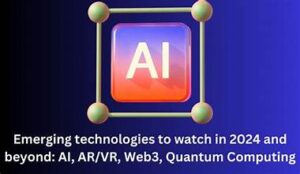
As we move further into 2024, the landscape of artificial intelligence (AI) is evolving at an unprecedented pace. The advancements in AI technologies are reshaping various sectors, driving innovation, and influencing how we interact with the world. In this article, we will explore the key trends and emerging technologies in AI that are set to make a significant impact this year.
1. Generative AI Expansion
Generative AI, which refers to algorithms that can create new content, is experiencing rapid growth. Models like GPT-4 and its successors are becoming more sophisticated, enabling the generation of high-quality text, images, and even video. This technology is increasingly being utilized in creative fields, including writing, art, and design. Businesses are leveraging generative AI to produce personalized content at scale, which enhances user engagement and drives new revenue streams.
Key Trends:
- Enhanced Creativity Tools: AI tools are being developed to assist artists and designers in creating novel works with minimal input.
- Content Personalization: Generative AI is being used to tailor marketing messages and product recommendations based on individual user preferences.
2. AI and Automation in Healthcare
AI is revolutionizing healthcare with advancements in diagnostic tools, personalized medicine, and drug discovery. Machine learning algorithms are improving diagnostic accuracy by analyzing medical images and patient data. In drug discovery, AI is accelerating the identification of potential treatments and reducing the time required for clinical trials.
Key Trends:
- AI-Driven Diagnostics: Enhanced imaging and diagnostic tools powered by AI are providing more accurate and timely medical assessments.
- Personalized Treatment Plans: AI is enabling the development of customized treatment plans based on individual genetic profiles and health data.
3. Ethical AI and Regulation
As AI technology advances, there is a growing emphasis on ethical considerations and regulatory frameworks. Ensuring that AI systems are transparent, fair, and accountable is crucial to building public trust and preventing misuse. Governments and organizations are increasingly focusing on developing guidelines and regulations to address these concerns.
Key Trends:
- AI Governance Frameworks: Development of comprehensive regulations to ensure ethical AI usage and protect user privacy.
- Bias Mitigation: Ongoing efforts to identify and reduce biases in AI algorithms to ensure fairness and equity.
4. AI in Cybersecurity
With the rise in cyber threats, AI is becoming a critical tool in enhancing cybersecurity measures. AI algorithms can analyze vast amounts of data to detect anomalies and potential threats in real time. This proactive approach allows organizations to respond to cyberattacks more swiftly and effectively.
Key Trends:
- Threat Detection and Prevention: AI systems are being developed to identify and mitigate cyber threats before they can cause significant damage.
- Automated Incident Response: AI-driven tools are streamlining incident response processes, reducing the need for manual intervention.
5. Advances in AI Hardware
The development of specialized AI hardware is driving improvements in processing power and efficiency. Innovations such as AI accelerators and neuromorphic chips are enabling faster and more efficient AI computations. These advancements are critical for supporting the growing demands of AI applications.
Key Trends:
- AI Accelerators: Hardware designed to accelerate AI processing tasks, enhancing performance and reducing energy consumption.
- Neuromorphic Computing: Development of chips that mimic the human brain’s architecture to improve AI efficiency and learning capabilities.
6. AI and Sustainability
AI is playing a pivotal role in promoting sustainability and addressing environmental challenges. From optimizing energy consumption to monitoring climate change, AI technologies are being harnessed to create a more sustainable future.
Key Trends:
- Energy Efficiency: AI algorithms are being used to optimize energy usage in various sectors, reducing waste and lowering carbon footprints.
- Environmental Monitoring: AI-powered sensors and analytics are providing valuable insights into environmental changes and helping to develop strategies for conservation.
7. Human-AI Collaboration
The future of AI will increasingly involve collaboration between humans and machines. AI tools are designed to augment human capabilities, enhancing productivity and decision-making processes. This collaborative approach is expected to drive innovation and improve outcomes across various domains.
Key Trends:
- Augmented Decision-Making: AI systems are being integrated into decision-making processes to provide data-driven insights and recommendations.
- Enhanced Productivity: AI tools are designed to assist professionals in their daily tasks, improving efficiency and effectiveness.
Conclusion
The future of AI in 2024 is marked by exciting advancements and emerging technologies that are set to transform various aspects of our lives. From generative AI and healthcare innovations to ethical considerations and sustainability efforts, the key trends highlighted in this article demonstrate the potential of AI to drive positive change. As we navigate this rapidly evolving landscape, staying informed about these developments will be essential for harnessing the full potential of AI and ensuring its responsible use.



